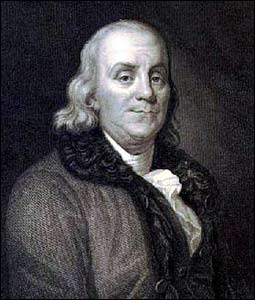Overview
Franklin's autobiography is divided into four fragments and is,
therefore, not a finished work. Yet it is constructed with a sense of public character in
mind. The first part is addressed to his son, while the others have a more general
public nature. Parts one and two examine his boyhood through his mid-20's and exemplify
the classic virtues for personal and community success that Franklin wishes to pass on for
others' profit. (These parts were written pre-revolutionary war.) Parts three and
four look closer at Franklin's years of activity, then at his triumphant reception in the
60's through the 80's. Yet, in addition to this goal of purblic service, Franklin's
autobiography also helps to create and to reinforce the public's perception of him and his
legacy to history.
The Autobiography is shaped by a Christian metastory of
salvation that has been secularized by the deist Franklin. The Christian understanding of
salvation as justification and sanctification is replaced in Franklin by character
development as a form of public presentation and by public service as a form of public
sanctity. For Franklin, "salvation" is achieved by self-control
which leads to personal autonomy. Public participation or membership is made possible by
temperance, rational consideration, and self-reliance. Franklin's secular soteriology is
that of the fully realized citizen, a view which has its foundation in the social theory
of the republic.
Key Themes
- Self-reliance, industry
- The public appearance of frugality and hard work
- Frank plainness
- Verbal modesty
- Individual self-examination in his 13 virtues
- A life of public service and improvement
- Empiricism
- Freedom of conscience
- Proverbial wisdom
- Lack of passion; clear self-control
Questions
Part One
- What do we learn about Franklin through his family origins, early
love of books, and study of the Spectator papers?
- Why does Franklin undertake a vegan diet?
- What lessons does he learn from his experiences with Keimer, Collins,
the governor, and Ralph?
- What is the Junto Club? Why is it important to Franklin?
- Why does he insist on the public appearance of frugality?
- What does he reveal about his interest in Miss Reid?
- What do the two letters reveal about the perceived usefulness of
Franklin's story? Do you agree? Why or why not?
Part Two
- Describe Franklin's plan for a moral calculus of self-examination.
What does he learn while trying to follow this pattern?
- What makes his plan for a subscription library admirable?
Part Three
- Describe the nature of Franklin's plan for a "United Party for
Virtue." What values inform it?
- List some of Franklin's projects, inventions, and attitudes in this
section. What do they reveal about him and his values? Why does he spend so much
time on detailing them?
- What is his attitude towards George Whitefield? Is it a wholly
positive or negative one?
- Describe Franklin's service in the Seven Years War. What kind of
attitude toward his involvement does he have?
Part Four
- What does the dispute over the assembly entail? Why is it important
to Franklin? Why does he stress the difference in conceptions of what is reasonable?
Overall
- What kind of impact does Franklin have as a narrator on his audience?
Why do we respond to him the way that we do?
- How do Franklin's beliefs compare and contrast with those of the
Puritans or the Quakers?
- If you were to ask Franklin what life's ultimate purpose is, what do
you believe he would say?
- Likewise, if you were to ask him what the purpose of a nation is,
based on the Autobiography, what do you believe he would say?
- What does Franklin's work suggest about American values and
character? Are these still true today? Explain.
|
